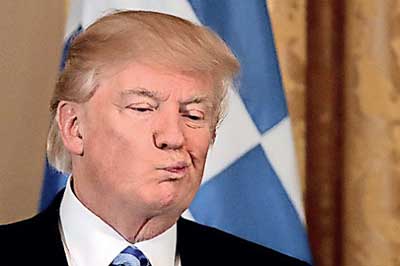Tuesday Feb 24, 2026
Tuesday Feb 24, 2026
Thursday, 27 April 2017 00:00 - - {{hitsCtrl.values.hits}}
Reuters: The US Congress was moving closer to crafting a deal to avoid shutting down at the stroke of midnight on Friday, but the details and even broad strokes of an agreement were still murky.
Some lawmakers are optimistic they can hammer out a budget bill to take the government to the end of the current fiscal year on Sept. 30, while others see Congress putting a short-term spending resolution in place for a week, while talks continue.
Either way, the pressure is mounting to come up with a plan before Friday night. If lawmakers do not have one, funding for many federal agencies will abruptly stop and millions of government workers will be temporarily laid off.
Many policy makers are nervous about a repeat of 2013, when the government was shuttered for 17 days.
On Monday President Donald Trump eased up on demands to include funding for a southern border wall in any budget pact, clearing a major obstacle in the negotiations.
White House Budget Director Mick  Mulvaney told CNN late on Tuesday that the Trump administration had also informed Democrats on Monday it would move discussions on building a border wall to September, when the government must negotiate the budget for its next fiscal year.
Mulvaney told CNN late on Tuesday that the Trump administration had also informed Democrats on Monday it would move discussions on building a border wall to September, when the government must negotiate the budget for its next fiscal year.
“And we thought that was going to get a deal done and we’ve not heard anything from them today,” he said. “So I’m not sure what’s happening.”
Even though Trump’s fellow Republicans control both chambers of Congress, they only have 52 seats in the Senate. To amass the 60 votes needed there to pass the budget, Republicans will have to bring Democratic lawmakers onto their side.
The most powerful Democrat in the Senate, Chuck Schumer, said on Tuesday his party is concerned about the ratio of increase in defense and non-defense spending. Democrats prefer a one-to-one ratio, and boosting both sides of the budget equally could become a sticking point in negotiations.
Democrats also want provisions for more healthcare coverage for coal miners and appropriations for healthcare subsidies. Health insurance would abruptly become unaffordable for 6 million Americans who rely on cost-sharing subsidies under the national health plan commonly called Obamacare.
Democrats have been seeking immediate assistance for a funding gap in Puerto Rico’s Medicaid program, federal health insurance for the poor, saying it is in such bad shape that 1 million people are set to lose healthcare.